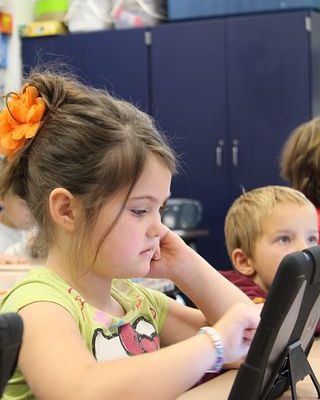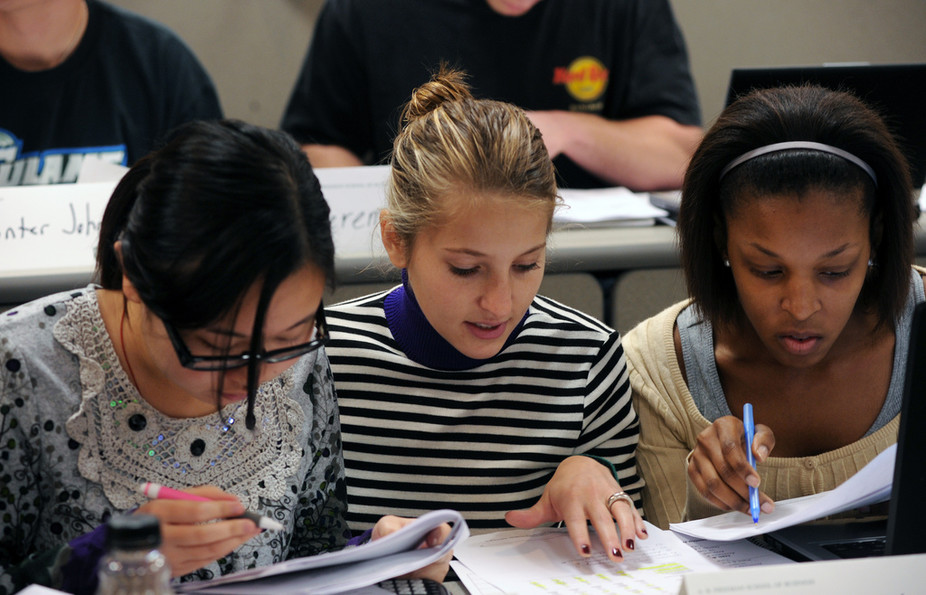Reading with your children: proper books vs tablets

Nicola Yuill, University of Sussex
Most of us have an opinion about whether we prefer reading on screen or paper: but what difference does it make for children? The truth is that technology is now encountered from babyhood. Anecdotes abound of toddlers swiping their fingers across paper rather than turning the page, while parents and teachers express their fear of screen addiction as tablets introduce new distractions as well as new attractions for young readers.
Ofcom figures tell us that children’s screen use rises sharply towards the end of primary school (from age seven to 11) and in the same period, book-reading drops. Increasing screen use is a reality, but does it contribute to a loss of interest in reading, and does reading from a screen provide the same experience as the feel of reading on paper?
We looked at this in our research on shared reading. This has been a neglected topic even though it is clearly a common context for children when they read at home. It might be their regular homework reading of a book from school, or a parent reading them a favourite bedtime story.
Warming up
We asked 24 mothers and their seven to nine-year-old children to take turns – mother reading or child reading – with popular fiction books on paper, and on a tablet. They read Barry Loser: I am not a Loser by Jim Smith and You’re a Bad Man, Mr Gum by Andy Stanton. We found that the children’s memory for the descriptions and narratives showed no difference between the two media. But that’s not the whole story.
The interactions of parent and child were found to be different in the independent ratings from video observation of the study. When they read from paper rather than a screen, there was a significant increase in the warmth of the parent/child interactions: more laughter, more smiling, more shows of affection.
It may be that this is largely down to the simple physical positioning of the parent and child when using the different media, as well as their cultural meaning. When children were reading from a screen, they tended to hold the tablet in a head-down position, typical of the way they would use the device for solo activities such as one-player games or web-browsing.
This meant that the parents had to “shoulder-surf” in order to share visual attention. In contrast, when parents read to their children on paper, they often held the book out to support shared visual engagement, tucking the child cosily under their arms. Some children just listened without trying to see the book, but instead curled themselves up comfortably on the sofa.

Megan Trace/Flickr, CC BY-NC
Keep taking the tablets?
Our research joins a growing list of studies comparing paper and e-books, but the answer isn’t a simple one. Shared reading is different to reading alone, for a start. And we may be interested in whether screen or paper makes a difference in how children learn to read, to understand, and enjoy reading. In short there are multiple perspectives to consider – developmental, educational, literary and technological – if we are to decide which medium is preferable.
Most studies have compared children at the earliest stages of reading, using paper books, e-books with audio and dictionary support to help less-skilled readers, and so-called “enhanced” e-books with multimedia, activities, hotspots and games.
Text with audio support helps children to decode text, and multimedia can keep a reluctant reader engaged for longer, so a good e-book can indeed be as good as an adult reading a paper book with their child. But we don’t yet have long-term studies to tell us whether constant provision of audio might prevent children developing ways of unpicking the code of written language themselves.

George Rudy/Shutterstock
Re-design for life
There is also increasing evidence that adding multimedia and games can quickly get distracting: one study found that young children spent almost half their time playing games in enhanced e-books, and therefore they read, remembered and understood little of the story itself. But there is plenty of guidance for e-book developers on the what, where and how much of designing multimedia texts.
And that brings us back to perhaps the defining conclusion from our own study. Books versus screens is not a simple either/or – children don’t read books in a cultural vacuum and we can’t approach the topic just from a single academic field. Books are just books, with a single typical use, but screens have many uses, and currently most of these uses are designed round a single user, even if that user is interacting with others remotely.
![]() We believe that designers could think more about how such technology can be designed for sharing, and this is especially true for reading, which starts, and ideally continues, as a shared activity in the context of close long-term family relationships. Book Trust figures report a drop from 86% of parents reading with their five-year-olds to just 38% with 11-year olds. There is a possibility that the clever redesign of e-books and tablets might just slow that trend.
We believe that designers could think more about how such technology can be designed for sharing, and this is especially true for reading, which starts, and ideally continues, as a shared activity in the context of close long-term family relationships. Book Trust figures report a drop from 86% of parents reading with their five-year-olds to just 38% with 11-year olds. There is a possibility that the clever redesign of e-books and tablets might just slow that trend.
Nicola Yuill, Senior Lecturer in Psychology, University of Sussex
This article was originally published on The Conversation. Read the original article.






